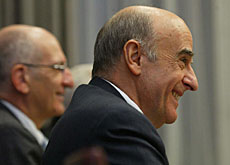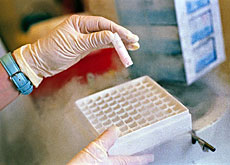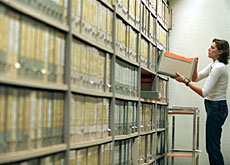Voters say yes to stem-cell research

The government has won strong backing for a law allowing stem-cell research on surplus human embryos, with two-thirds of Swiss voting in favour.
In a nationwide poll on Sunday, voters also gave their support to two other government proposals: reform of the federal system, and a renewal of the federal authorities’ mandate to levy taxes.
The new law on stem-cell research won the backing of 66.4 per cent of Swiss voters.
In French-speaking western Switzerland the percentage was even higher. Canton Geneva recorded the highest level of support at 84.5 per cent.
The new legislation will permit research on stem cells from surplus human embryos under strict conditions.
The production of stem cells will be limited to embryos not older than seven days. Therapeutic cloning and the trade in embryos will remain banned along with research on the embryos themselves.
Parliament approved the law in 2003, but an alliance of religious and pro-life groups as well as leftwing opponents of gene technology challenged the legislation to a nationwide vote.
The interior minister, Pascal Couchepin, said the clear yes was a vote of confidence for science.
He said it showed people were able to take decisions on complex issues.
Controversy
The government, the four main political parties and the business community came out in favour of stem-cell research despite prominent dissenting voices.
Opponents argued that the law overstepped ethical boundaries, while its supporters said it was crucial to ensuring that Switzerland’s research community remained among the best in the world.
Those in favour of stem-cell research pointed out its importance for finding medical cures.
The Swiss stem-cell law falls between the liberal regulations in Britain and Austria’s restrictive legislation.
Three years ago Switzerland’s National Science Foundation gave its approval for research on stem cells imported from abroad.
Reform and tax
Final results showed 64 per cent of voters approved a wide-ranging reform of the federal system. The renewal of a mandate for the federal government to impose taxes was approved by 74 per cent.
The reform plans are aimed at redressing the balance of power between the federal government and the 26 cantons. They are also designed to redistribute responsibilities and funding in about 30 policy areas.
Supporters said reform was needed to close the gap between richer and poorer regions, and to make the system of subsidies more transparent.
On Sunday, voters also approved a proposal to renew the mandate for the federal government to levy taxes, including Value Added Tax, until 2020.
Under Switzerland’s three-tier fiscal system, the local and cantonal authorities as well as the federal government have a right to impose taxes.
swissinfo
The electorate was asked to vote on research on embryonic stem cells, reform of the federal system and the renewal of the mandate for federal taxes.
Stem-cell research was passed by 66.4% of the electorate; federal reform by 64.4%, and the tax mandate by 73.8%.
Voter turnout was around 36%.

In compliance with the JTI standards
More: SWI swissinfo.ch certified by the Journalism Trust Initiative



You can find an overview of ongoing debates with our journalists here. Please join us!
If you want to start a conversation about a topic raised in this article or want to report factual errors, email us at english@swissinfo.ch.